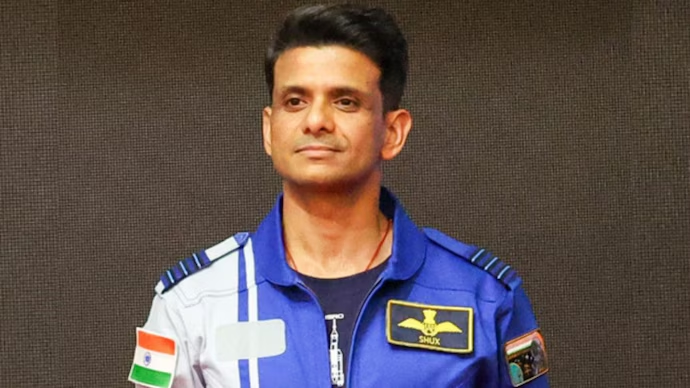New Delhi Achieves Space Milestone as Shubhanshu Shukla is Welcomed to the ISS
New Delhi has made an astronomical leap in its space exploration goals as Shubhanshu Shukla, an Air Force pilot, became the first Indian astronaut to enter the International Space Station (ISS) on Thursday. The historic moment unfolded as Shukla and three fellow astronauts gracefully transitioned from the Crew Dragon capsule into the ISS, marking a significant chapter in India’s space endeavor.
The mission, known as Axiom-4, commenced with a smooth lift-off from Florida’s Kennedy Space Center. After a meticulous 28-hour journey, the Dragon capsule docked at the ISS, approximately 424 kilometers above the northern Atlantic Ocean. This monumental achievement is a testament to the extensive preparation and expertise of Shukhla and his team, alongside the collaboration of several international space agencies.
As per the report by NDTV, the docking procedure commenced with a ‘soft capture’ at 4:01 PM IST, followed by a dependable ‘hard capture’, ensuring a safe connection between the capsule and the ISS. This successful accomplishment was celebrated by both the crew aboard the Dragon and the astronauts currently stationed on the ISS, who welcomed Shukla and his companions with open arms and cheer.
A Journey Through Space
The four-man crew aboard the Crew Dragon included renowned astronauts like Peggy Whitson from the United States, Slawoz Wisniewski of Poland, and Tibor Kapu from Hungary. Although Shukla didn’t immediately join his fellow astronauts aboard the ISS, they eagerly prepared for the opening of the hatch, which was scheduled for 6:10 PM IST.
The journey of Axiom-4 began at 12:01 PM IST on Wednesday when SpaceX’s Falcon 9 rocket launched from the legendary Launch Complex 39A, the same site employed for the Apollo 11 mission. Shukla and his fellow astronauts had faced numerous launch delays — six, to be exact — pushing their launch schedule to the brink of a seventh due to a software glitch related to weather data. However, the issue was promptly resolved, allowing the mission to take flight.
The task awaiting Shukla and his crew is considerable, involving 60 scientific experiments over a two-week stay aboard the ISS. Among these, seven experiments are India’s contributions, including a study on ‘water bears’ (tardigrades), to explore how life adapts to microgravity.
A Collective Achievement
Reflecting on the extraordinary experience, Shubhanshu Shukla expressed his joy and humility at being part of this historic mission. With a sense of awe, he described the launch as “magical,” especially after weeks of anticipation and quarantine before the flight. “When I finally sat on the launchpad after 30 days of preparation, I thought… ‘let’s just go!'” Shukla stated, relaying the thrill of experiencing weightlessness as the rocket soared into the abyss of space.
In his heartfelt remarks, Shukla acknowledged the global collaboration that made this mission possible, emphasizing that it was a collective effort. “I truly appreciate the efforts of every individual who made this journey possible. This accomplishment belongs to all of us,” he noted.
The successful onboarding of the first Indian astronaut to the ISS is a landmark achievement in the realm of science, technology, and international cooperation. As India’s space exploration ambitions grow, Shukla’s historic flight propels the nation into a new era, raising hopes for a future filled with innovations in space travel and research.
Impacts on Future Space Missions
The ramifications of Shukla’s mission are immense. As India positions itself as an emerging power in space technology, the significance of this achievement extends beyond national pride. It opens avenues for scientific collaboration, skill development, and technological advancements in a country passionate about space exploration.
With this mission, India not only showcases its capabilities but also invites more nations to partnership in future space endeavors, including potential crewed missions to Mars and beyond. The government hopes that successful missions like Axiom-4 will stimulate interest in STEM (science, technology, engineering, and mathematics) fields among Indian youth, inspiring a new generation of astronauts, engineers, and scientists.
The ISS has been a hub for global research and collaboration since its inception, and Shukla’s entry only strengthens the narrative of a united effort in advancing humanity’s understanding of science and the universe. As time goes on, the findings from the experiments conducted during this mission could lead to breakthroughs in health, agriculture, and resource management.
What Lies Ahead for Shubhanshu Shukla?
Shukla’s experience aboard the ISS is expected to be transformative, both personally and professionally. As he works closely with seasoned astronauts, the knowledge gained during these two weeks will enhance his expertise in space exploration. Upon returning to Earth, Shukla is poised to contribute to India’s future missions, offering insights and experiences gleaned from his time in orbit.
Furthermore, the extensive studies and experiments slated for the duration of the mission underscore the increasing focus on space as a critical frontier for scientific inquiry. The results could provide valuable information on how various organisms endure the rigors of space travel and could help inform future missions to distant celestial bodies.
As Shukhla continues his journey aboard the ISS, the world watches with fascination and anticipation. His journey symbolizes not just individual accomplishment but an entire nation’s aspirations for a brighter future in space exploration.
For more on India’s scientific advancements, check out our piece on India’s Recent Scientific Missions. Stay updated on the latest space discoveries by visiting Exploring Space Discoveries for insightful content.
As we celebrate this monumental achievement, there is no denying that the sky is indeed not the limit, but a launching pad for the dreams of nations like India, eager to discover what lies beyond the stars.
DISCLAIMER
We have taken every measure to ensure that the information in this article and on our social media platforms is accurate, verified, and obtained from reliable sources. For feedback or complaints, please contact us at info@hamslive.com.


